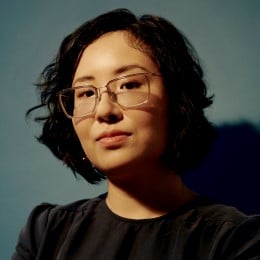- New York is an emerging AI startup hub due to its diverse mix of industries, academic and corporate AI Labs, and the presence of local venture funds investing in AI.
- In New York, 71% of AI startups are in the AI application space versus 66% globally.
- New York is home to 35 AI unicorns who have raised $17B.
New York is home to a close-knit artificial intelligence (AI) ecosystem that may surprise those outside the community, but it’s obvious to any New York-based founder or investor that the types of AI companies built in this city would not exist elsewhere. San Francisco, home to Open AI, Anthropic and the “Cerebral Valley” tends to soak up more spotlight as an AI hub. However, San Francisco’s concentration of tech makes for boom-and-bust cycles, while New York is more balanced due to its diverse array of industries including finance, fashion, biotech, media and entertainment.
New York is also home to the headquarters of 44 Fortune 500 companies, creating a concentration of top decision makers and AI buyers. These features create a synergy between AI startups and the industries they hope to transform. In this article, we dive into the forces influencing the growth of New York’s AI ecosystem, double-click on venture funding, examine a few of the unique startups and close with a snapshot of the investor ecosystem.
Brian Schechter, Partner at Primary Ventures, explains why New York City has an increasing advantage in AI startups, “As Generative AI transitions from an ambitious promise to a palpable reality, New York City is poised to take center stage. While San Francisco has established its dominance in foundation models, New York City is on the brink of becoming synonymous with commercial prosperity in AI. Moreover, the city is currently a bustling hub for AI talent, entrepreneurs, and investors.”

AI is a broad term with the earliest research dating back to the 1950s. Before the launch of Open AI’s ChatGPT in 2022, AI had a strong correlation to overall VC investment. But after the launch, AI companies began to receive more attention from investors and the public (see charts below).1
NY VC Activity, 2018-2023
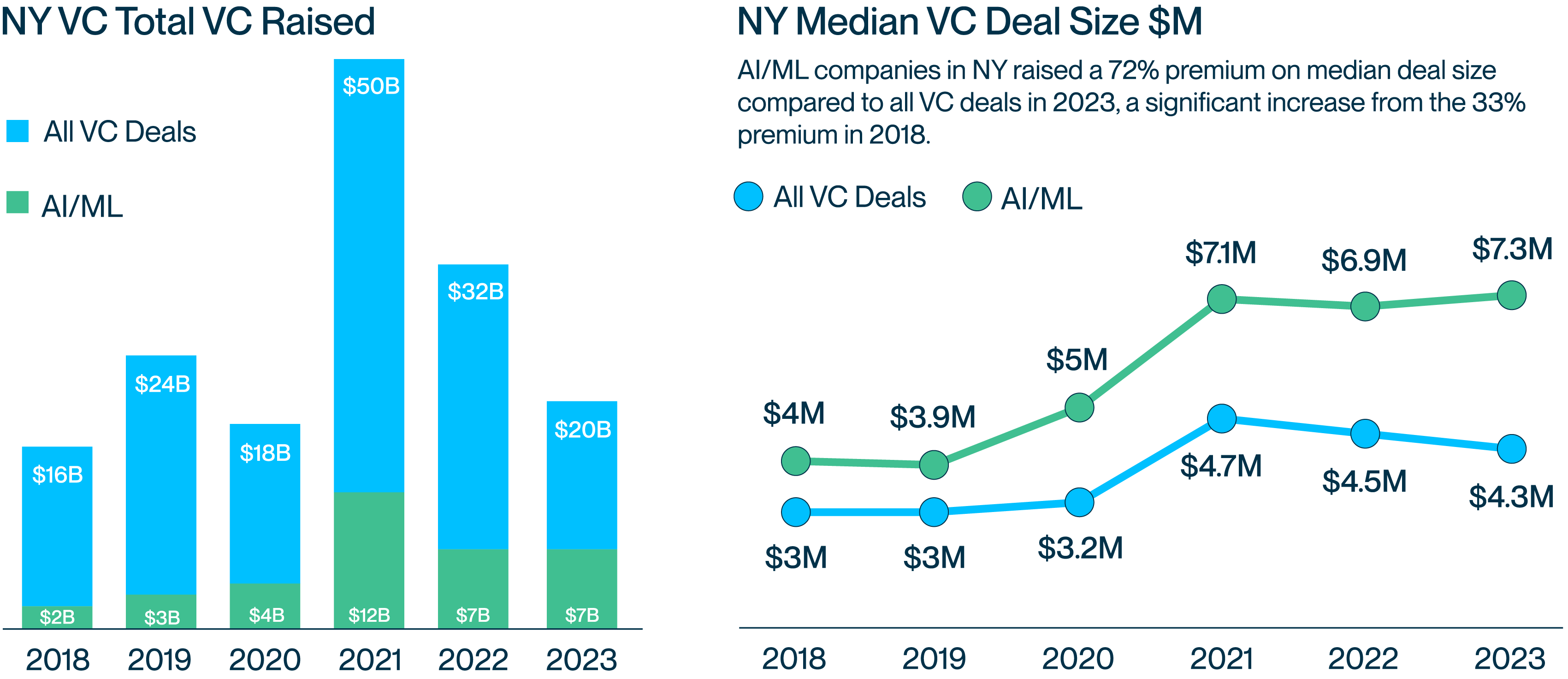
Broadly speaking, AI and machine learning (ML) companies fall into four categories:
- Vertical applications: These companies bake AI into their core products, building on top of language models such as ChatGPT.
- AI model development: This core group is enabling the AI revolution by developing the principal technology of algorithms and language models, such as OpenAI’s ChatGPT-3.
- Autonomous machines: Factory robots and self-driving vehicles make up the lion’s share of this group, which is applying computer vision algorithms to improve manufacturing and transportation.
- Computing infrastructure: Hardware companies are reinventing computing infrastructure for the massive new scale that AI computing demands with graphics processing units (GPUs) and semiconductors.
Vertical applications are the most present segment in New York’s AI community with 71% of companies receiving venture backing are in this segment. For more on AI, see SVB’s latest State of the Markets.
Current and Former Venture Backed AI Companies By Layer
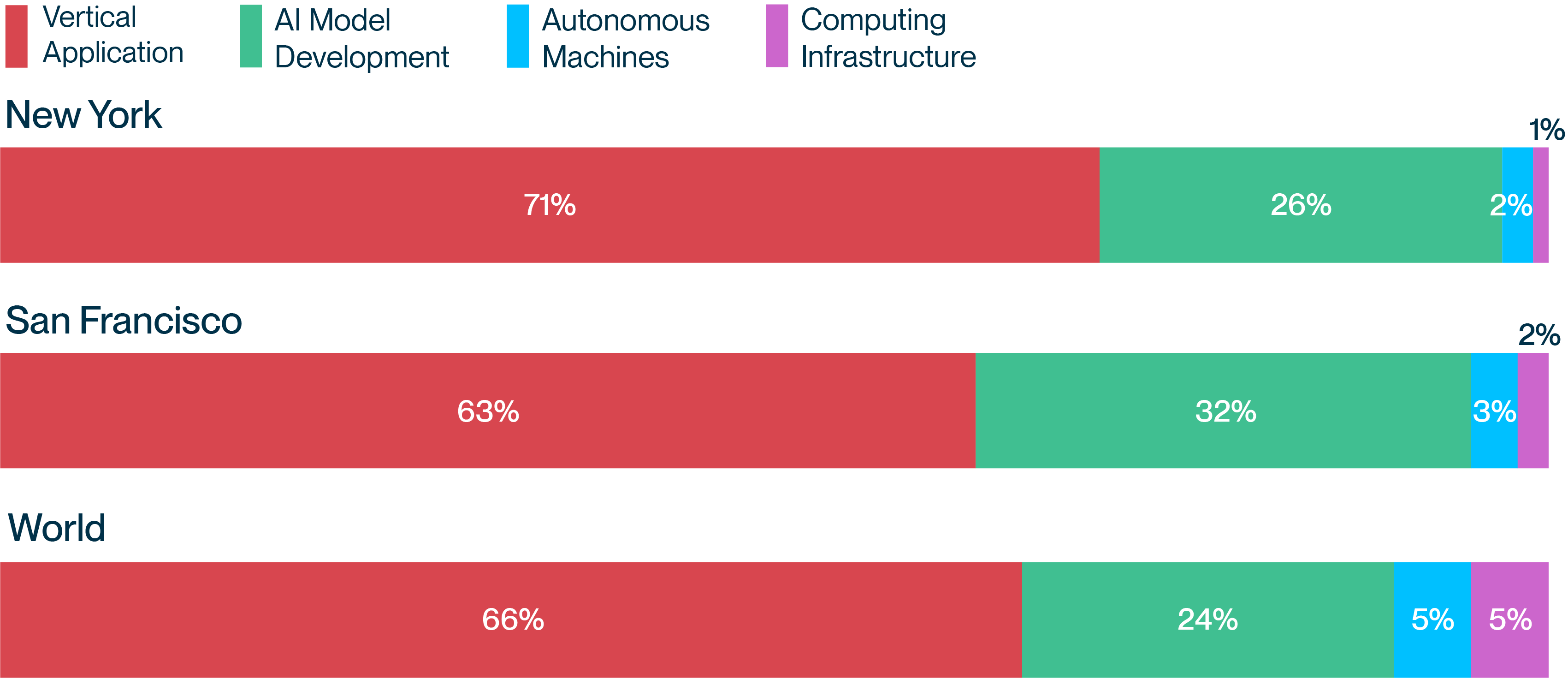
The AI ecosystem in New York is a grassroots community of founders, investors, incubators and institutionally supported by universities, state and federal government and industry partners. Community groups like New York Artificial Intelligence (NYAI) host conferences and meetups.
In 2024, New York state unveiled plans to establish itself as an AI hub through a $400M public-private partnership: the Empire AI consortium. The consortium consists of seven universities (Columbia, Cornell, New York University, Rensselaer Polytechnic Institute (RPI), the State University of New York (SUNY), the City University of New York (CUNY) and the Flatiron Institute) in collaboration with NVIDIA.
In 2023, Columbia University received a $20M grant from the National Science Foundation (NSF) to spearhead the AI Institute for Artificial and Natural Intelligence (ARNI). The mission of ARNI is to develop technologies that bridge the gap between artificial and biological networks.2
Large corporations have New York-based research teams that are funding and innovating AI in-house. The global headquarters of IBM Research, for example, is located just outside the city3 where many of IBM’s breakthroughs in AI and semiconductors have taken place. Amazon4, Google5, Notion6 and Meta (including Chief AI Scientist, Yann Lecun)7 all have AI research talent in New York. In February 2024, Open AI announced it would lease about 60,000 square feet of office space in New York City. Likewise, Open AI competitor Cohere announced in March 2024 that they will be expanding their footprint in New York. This deep pool of local tech talent has the potential to spin off additional startups.
Grace Isford, Partner at Lux Capital, explains why and how NYC attracts new talent to the city, “Many forget that NYC is home to some of the world’s top AI labs, including NYU’s CILVR Lab led by Meta Chief Scientist Yann LeCunn as well as top labs at Columbia, Cornell and Princeton. NYC is also a huge home to international talent and startups moving to the US and is a top choice for new grads looking to live in NYC because they want to live here.”
Isford recently spoke on Bloomberg TV about the ecosystem in New York. She cited that proximity to diverse industries, great talent and prominent AI labs (both corporate and academic) makes New York a promising new hub.
There are currently 35 New York AI unicorn companies that have raised a total of $17B. We double-click on two of these companies: Hugging Face and Runway AI.
Select 2023 AI/ML VC Deals
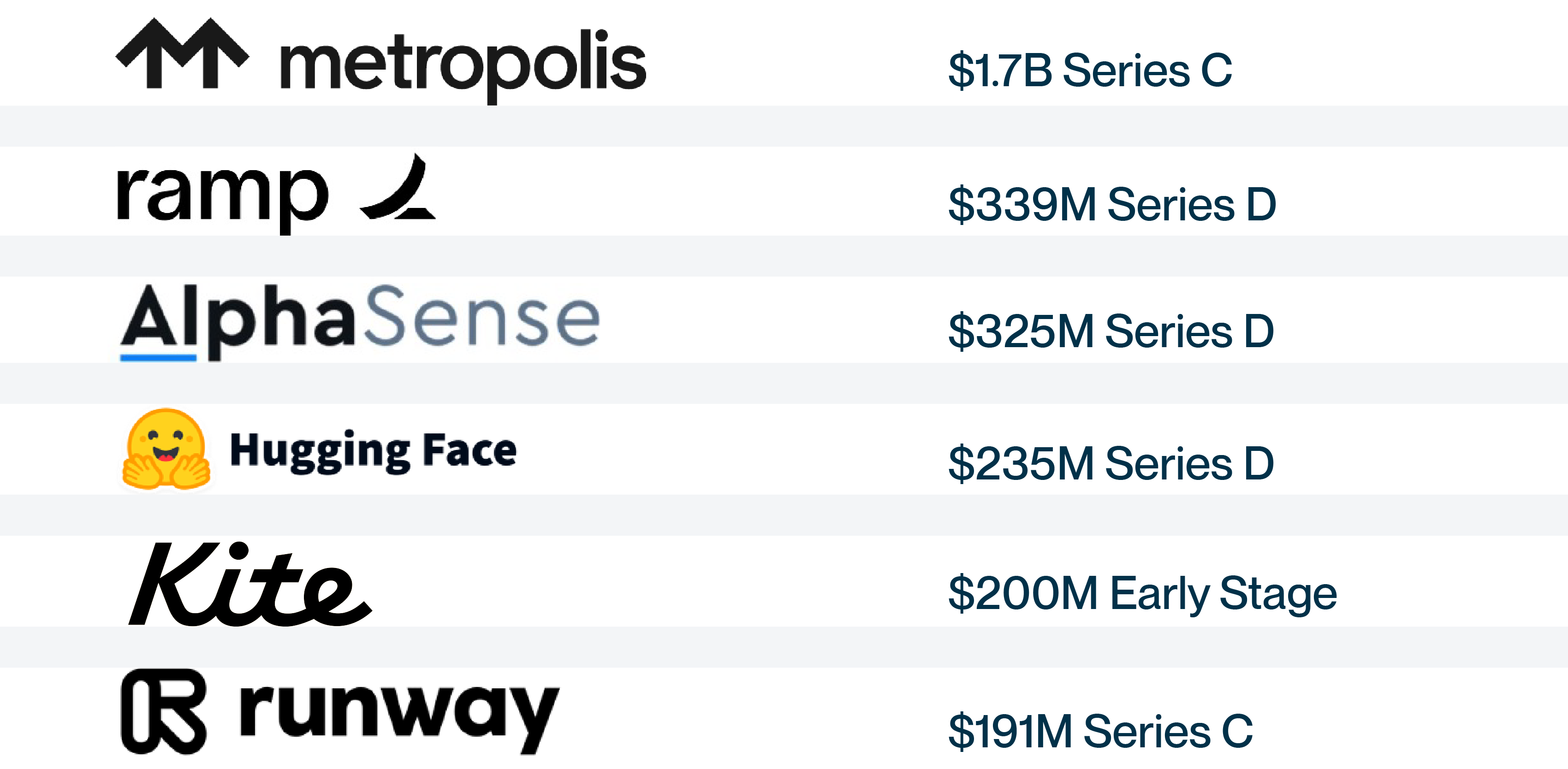
Hugging Face (named after the hugging face emoji) built a GitHub-like hub for AI code, hosting libraries of transformer models, datasets and applications. The company has raised $235M at a $4.5B valuation, with Qualcomm, Google, IBM, Intel, Amazon, AMD, NVIDIA and Salesforce among its investors. It has become a crossroads in the ecosystem where you can find models and training datasets contributed by over 50,000 organizations, ranging from big tech companies, like AWS, Google and Meta, to small startups and hobbyists – all hosted on the same platform.
Runway AI, a Lux Capital investment (co-creator of Stable Diffusion), is a web-based video editor. It brought generative video content to the market in 2023 with the launch of its model Gen-1. They have raised $236M at a $1.5B valuation from investors such as Google and NVIDIA and have garnered customers in the TV and film industry. Runway AI is a good example of a NY AI company siting at the intersection of multiple industries: media, tech and entertainment. The Late Show on CBS uses Runway AI for editing videos used within their segments. Despite their success, the competition is heating up with the launch of OpenAI’s SORA, Google’s Lumiere and Stability AI’s SDV1.1. Runway CEO Cristóbal Valenzuela embraced the competition, tweeting “game on” after the SORA announcement.

For investors, it’s also game on when it comes to AI. One in four funds that closed in 2023 had a stated focus on AI, either falling in AI native or applied AI categories. Additionally, AI funds are closing at nearly twice the rate of non-AI funds.8 In an increasingly tough fundraising environment for funds, this is a bright spot.
New York headquartered funds are actively investing in local AI startups. We take a look at several of these fund’s portfolios and strategies.
FirstMark Capital, an early-stage focused fund, has invested in several AI companies that have gone on to become unicorns: Dataikku, Hyperscience, Bluecore and Justworks. Matt Turck, Partner with FirstMark, spoke with Nomic.ai’s co-founder, Brandon Duderstadt, about the comparison of the San Francisco and New York AI ecosystems. Duderstadt honed in on the primary differences between the two cities: “The New York AI ecosystem is incredible. It's definitely smaller than the Bay, but that makes it tight knitted in way that is almost lacking in the Bay.” He goes on to say, “One of the things I love about New York is that you are not just surrounded by Tech. You are surrounded by incredible people of all walks of life, be it art or acrobatics or companies that are doing things that are not necessarily AI but that are up and coming.” He also mentioned the presence of some local New York AI heavy hitters, like Hugging Face, as being a differentiator.
New York Headquartered AI Unicorns
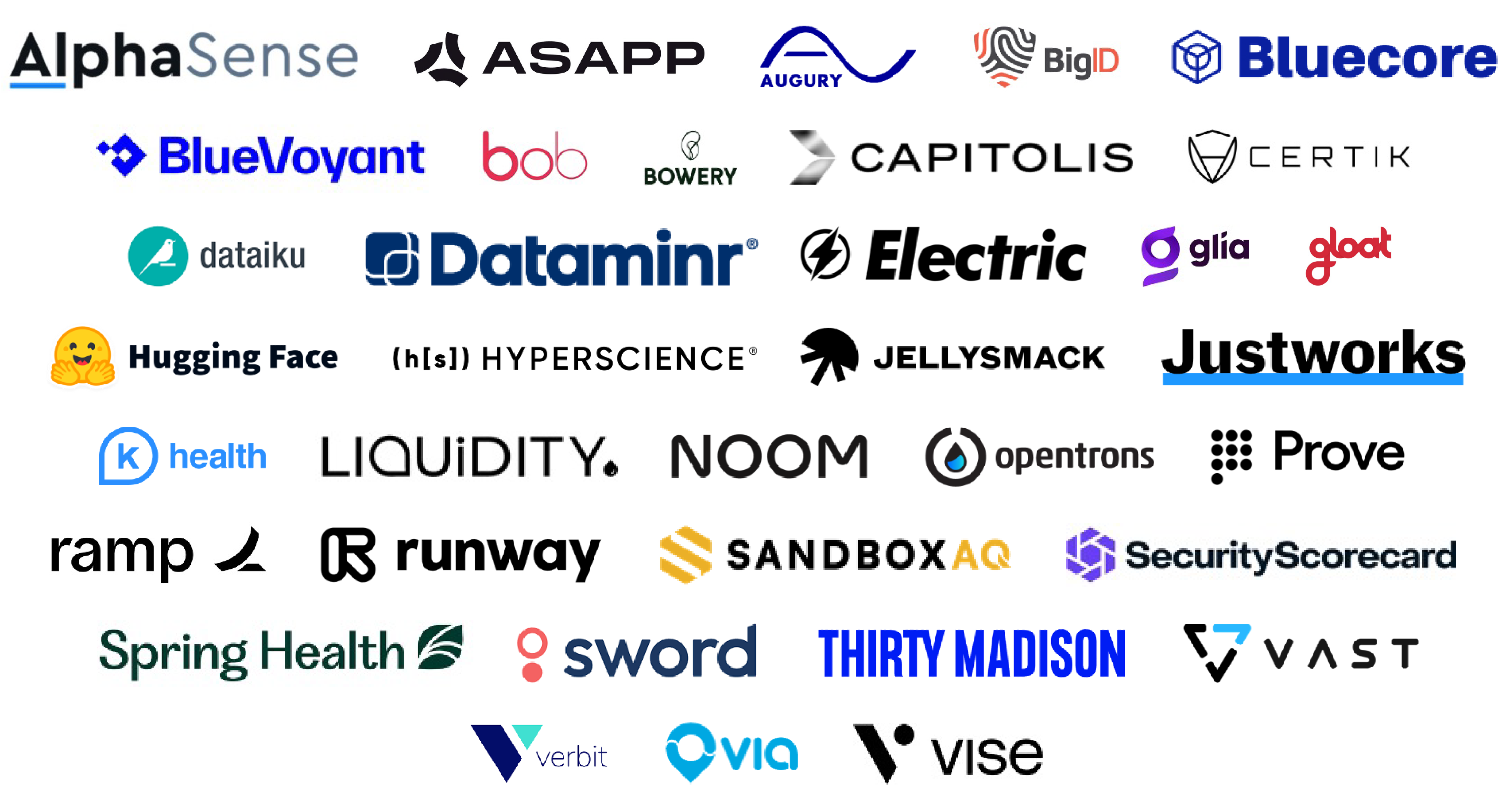
Greycroft announced in late 2023 that it will refocus its core strategy around AI startups. Their portfolio includes Thirty Madison, Arthur and Trullion.
Primary Venture Partners operates as both a fund and a startup studio (under Brian Schechter). Their portfolio includes AI startups such as Electric, Noom and Black Crow AI.9
Wing has an AI-first investment thesis. Their investments include NYC-based AI startup Kay.ai, which accelerates data extraction workflows for enterprises using high-quality embeddings and fine-tuned LLMs. Kay.ai’s founders, Vishal Rohra and Achyut Joshi, were formerly ML engineers at Microsoft, Twitter and Amazon.
Another portfolio company, Slang.ai (founded by former Spotify data leaders Alex Sambvani and Gabriel Duncan), is a voice-based AI agent that answers phone calls on behalf of businesses such as restaurants and retail stores and answers questions, takes appointments and addresses customer issues.
The global AI ecosystem is a fast-paced environment. While San Francisco is home to companies building some of the core foundation models, New York, with its magnetic draw of talent due to leading universities, multidisciplinary industries and the presence of large companies, is the ideal incubator for AI startups especially in the application space. The world needs both bicoastal hubs to move AI innovation forward.
